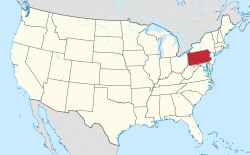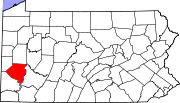West Deer Township, Pennsylvania
West Deer Township | |
|---|---|
Township | |
 Municipal Building | |
 Location in Allegheny County and state of Pennsylvania | |
 Location of Pennsylvania in the United States | |
| Country | United States |
| State | Pennsylvania |
| County | Allegheny |
| Area | |
| • Total | 28.87 sq mi (74.78 km2) |
| • Land | 28.87 sq mi (74.77 km2) |
| • Water | 0.01 sq mi (0.01 km2) |
| Population (2020) | |
| • Total | 12,262 |
| • Density | 412.28/sq mi (159.18/km2) |
| Time zone | UTC-5 (EST) |
| • Summer (DST) | UTC-4 (EDT) |
| FIPS code | 42-003-82800 |
West Deer Township is a township in Allegheny County, Pennsylvania, Pennsylvania, United States. The population was 12,262 at the 2020 census.[2]
History
[edit]In 1788, the Pennsylvania Legislature created Allegheny County from some of Westmoreland and Washington counties and most of the Depreciation Lands north of the Ohio River and west of the Allegheny River. The county was expanded a year later. Of the county's then seven townships, Pitt Township comprised most of the northern part of the county. It is this township that would be divided in 1796 to form Pine and Deer townships.[3] Deer Township was made up of what is today the eastern parts of Richland and West Deer, Frazer, most of East Deer, part of Hampton, and all of Fawn and Harrison.[4] Deer gets its name from Chief Deer, a sub-chief of Iroquois leader Guyasuta. Half of Deer Township was used to create Indiana Township in 1805. In 1836, upon petition of its citizens, Deer was divided into East Deer and West Deer. In 1860, the western boundary of West Deer was moved eastward, the land being used to form Richland Township. In 1861, part of the southwestern corner of West Deer was used to form Hampton Township. West Deer also annexed land along its southern border from Indiana Township in this exchange.[3] Historically, much of West Deer's economy has been based on farming and coal mining. Many coal towns such as Curtisville, Bairdford, and Russellton were dominant forces in the industry. In recent years, significant suburban growth has occurred in the southwestern and central portions of the township, while other portions have remained rural.
Geography
[edit]According to the United States Census Bureau, the township has a total area of 29.0 square miles (75.1 km2), all land.
Streams
[edit]Deer Creek flows through the township.[5]
The township contains the following communities: Allegheny Acres, Bairdford, Benjamin, Blanchard, Culmerville, Curtisville, Fawn Haven, Magill Heights, Red Hot, and Russellton.
Demographics
[edit]| Census | Pop. | Note | %± |
|---|---|---|---|
| 1850 | 1,716 | — | |
| 1860 | 1,865 | 8.7% | |
| 1870 | 1,299 | −30.3% | |
| 1880 | 1,438 | 10.7% | |
| 1890 | 1,301 | −9.5% | |
| 1900 | 1,225 | −5.8% | |
| 1910 | 2,206 | 80.1% | |
| 1920 | 5,290 | 139.8% | |
| 1930 | 6,461 | 22.1% | |
| 1940 | 7,815 | 21.0% | |
| 1950 | 7,484 | −4.2% | |
| 1960 | 9,038 | 20.8% | |
| 1970 | 10,074 | 11.5% | |
| 1980 | 10,897 | 8.2% | |
| 1990 | 11,371 | 4.3% | |
| 2000 | 11,563 | 1.7% | |
| 2010 | 11,771 | 1.8% | |
| 2020 | 12,262 | 4.2% | |
| Sources:[6][7][8][9][10][11][12][13] | |||
As of the 2000 census, there were 11,563 people, 4,378 households, and 3,349 families residing in the township. The population density was 399.0 inhabitants per square mile (154.1/km2). There were 4,584 housing units at an average density of 158.2 per square mile (61.1/km2). The racial makeup of the township was 98.94% White, 0.29% African American, 0.11% Native American, 0.22% Asian, 0.10% from other races, and 0.35% from two or more races. Hispanic or Latino of any race were 0.42% of the population.[12]
There were 4,378 households, out of which 35.0% had children under the age of 18 living with them, 64.3% were married couples living together, 8.7% had a female householder with no husband present, and 23.5% were non-families. 20.4% of all households were made up of individuals, and 9.5% had someone living alone who was 65 years of age or older. The average household size was 2.62 and the average family size was 3.04.[12]
In the township the population was spread out, with 25.0% under the age of 18, 5.7% from 18 to 24, 31.3% from 25 to 44, 23.8% from 45 to 64, and 14.2% who were 65 years of age or older. The median age was 39 years. For every 100 females, there were 95.3 males. For every 100 females age 18 and over, there were 93.1 males.[12]
The median income for a household in the township was $46,370, and the median income for a family was $52,295. Males had a median income of $40,824 versus $26,032 for females. The per capita income for the township was $20,358. About 4.5% of families and 6.3% of the population were below the poverty line, including 7.6% of those under age 18 and 6.6% of those age 65 or over.[12]
Government and politics
[edit]| Year | Republican | Democratic | Third parties |
|---|---|---|---|
| 2020 | 60% 4,545 | 38% 2,915 | 1% 77 |
| 2016 | 62% 3,712 | 37% 2,176 | 1% 57 |
| 2012 | 60% 3,362 | 39% 2,194 | 1% 68 |
References
[edit]- ^ "2016 U.S. Gazetteer Files". United States Census Bureau. Retrieved August 13, 2017.
- ^ "Race, Hispanic or Latino, Age, and Housing Occupancy: 2010 Census Redistricting Data (Public Law 94-171) Summary File (QT-PL), West Deer township, Allegheny County, Pennsylvania". United States Census Bureau. Retrieved September 30, 2011.
- ^ a b Ken Lewetag. "West Deer Township". West Deer Township. Archived from the original on April 29, 2010. Retrieved July 4, 2010.
- ^ Warner History (attributed) (1889). "West Deer Township". West Deer Township. Archived from the original on April 29, 2010. Retrieved July 4, 2010.
- ^ "Deer Creek". Geographic Names Information System. United States Geological Survey, United States Department of the Interior. Retrieved December 20, 2010.
- ^ "Population of Civil Divisions Less than Counties" (PDF). 1870 United States Census. U.S. Census Bureau. Retrieved November 25, 2013.
- ^ "Population of Civil Divisions Less than Counties" (PDF). 1880 United States Census. U.S. Census Bureau. Retrieved November 24, 2013.
- ^ "Population-Pennsylvania" (PDF). U.S. Census 1910. U.S. Census Bureau. Retrieved November 22, 2013.
- ^ "Number and Distribution of Inhabitants:Pennsylvania-Tennessee" (PDF). Fifteenth Census. U.S. Census Bureau.
- ^ "Number of Inhabitants: Pennsylvania" (PDF). 18th Census of the United States. U.S. Census Bureau. Retrieved November 22, 2013.
- ^ "Pennsylvania: Population and Housing Unit Counts" (PDF). U.S. Census Bureau. Retrieved November 22, 2013.
- ^ a b c d e "U.S. Census website". United States Census Bureau. Retrieved January 31, 2008.
- ^ "Incorporated Places and Minor Civil Divisions Datasets: Subcounty Population Estimates: April 1, 2010 to July 1, 2012". U.S. Census Bureau. Retrieved November 25, 2013.
- ^ Bureau, U. S. Census. "U.S. Census website". United States Census Bureau. US Census Bureau. Retrieved December 1, 2019.
{{cite web}}:|last1=has generic name (help) - ^ EL. "2012 Allegheny County election". Pittsburgh Tribune-Review. Retrieved October 15, 2017.
- ^ EL. "2016 Pennsylvania general election..." Pittsburgh Post-Gazette. Retrieved October 15, 2017.
- ^ "Election Night Reporting".
External links
[edit] Media related to West Deer Township, Allegheny County, Pennsylvania at Wikimedia Commons
Media related to West Deer Township, Allegheny County, Pennsylvania at Wikimedia Commons- West Deer Township official website

